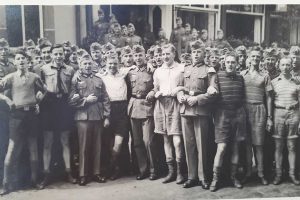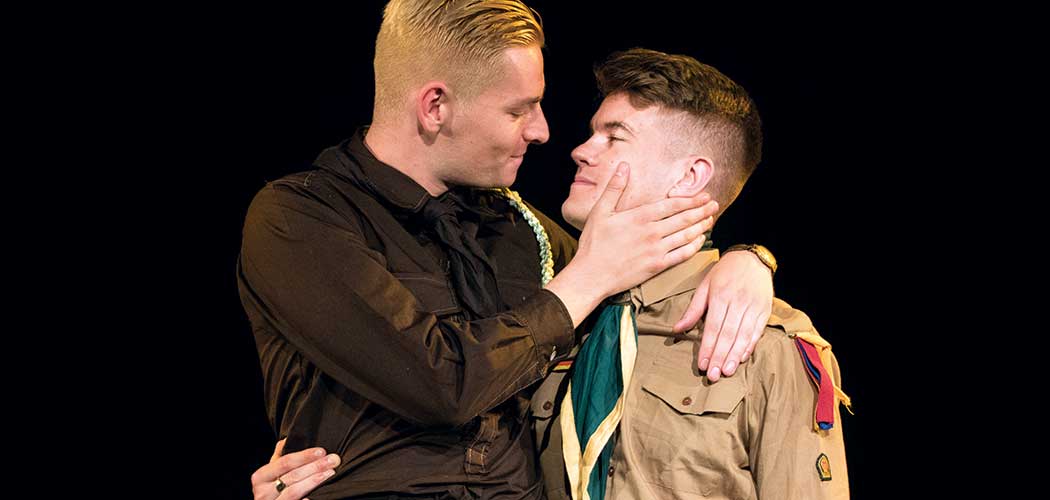The Good Scout is the new play from hit writer Glenn Chandler which opens on Wednesday 9 October at the Above The Stag Theatre. It was inspired by true events in the 1930s when members of the Hitler Youth were invited to the UK by Lord Baden-Powell. Dave Cross spoke to Glenn about this fascinating play.

Hi Glenn, how would you describe The Good Scout?
The Good Scout is the story of two Rover Scouts in their early twenties, Will Parrish and Jacob Collier, who play host to a cycling party of Hitler Youth in 1938. Britain is on the cusp of war with Germany, yet these Scout/Hitler Youth exchange visits did actually take place. Jacob is fascinated by and deeply attracted to tall, blond Hitlerjugend patrol leader Gerhard, whose father is a general in the Luftwaffe. Will, a junior reporter on a local newspaper, is more wide-eyed with innocence, reading into the visit a real desire for peace and friendship between Britain and Germany. When a relationship develops between Gerhard and Jacob, (and the patrol leader’s friend Friedrich, who is also gay, confesses he doesn’t want to return to Germany where, he is told, he could have his balls chopped off by a Nazi doctor) Will finds his moral values stretched in more than one direction. Even more so when he is warned by a family friend that the boys might not just be cyclists but ‘spyclists’, taking photographs that could be of use in an invasion. When the four go camping for a night in the Fenlands of Cambridgeshire, jealousy and increasing tensions mount to a dramatic climax.
What can you tell us about the actual events that inspired you?
It really did happen. By 1938, many Hitler Youth parties had visited England, not only as the guests of the Scouts, but of civic corporations too, and in one instance the Maldon Cycling Club in Essex. These were due in no small part to the efforts of Lord Baden-Powell who, without benefit of hindsight, admired Hitler greatly. The best documented visit was to Tamworth in Staffordshire, which was instigated by the half-German scoutmaster, George Kemper, a sausage manufacturer and Nazi sympathiser who saw himself as a local commandant in the event of an invasion. British boy scouts visited Germany too. The Tamworth troop were the guests of the Hitlerjugend in Hamburg, where they came back with stories of camps of boys so vast that food had to be delivered by light railway, and where naked youths stood exposed to all visitors in unscreened showers beneath huge water tanks. Another troop of boys attended a Nuremberg rally, where one lad was so impressed he described it as like going back to ancient Rome.
Why did you decide to write the play about these events?
I wanted to write an LGBTQ play that had never been done before. Homosexuality was rife in the Hitler Youth, understandably given hundreds of boys pressed into uniforms and sent off on long hikes together. The Hitlerjugend had their own ‘secret police’, boys responsible for making sure that small groups didn’t go off into the woods together for immoral purposes. Punishments were harsh. I was very keen to explore the potential of different cultures coming together, the Boy Scouts with their vows to God and Country, the Hitler Youth and their total allegiance to Hitler, in an age when homosexuality was illegal. Boys would still be boys however.
How easy was it to do the research and did you discover anything surprising?
The National Archives in Kew had files full of fascinating material. MI5 were deeply worried about Nazi youths coming over to England on bicycles and exploring the countryside, taking photographs. A Nazi cycling magazine had given its readers instructions on what to do when cycling in foreign countries, as photographs ‘might one day be of use to the Fatherland’. There were even lists of the names of the Hitler Youth who had visited England, where they came from, and who they were staying with.
How much of the play is factual and how much pure storytelling?
The story of Will and Jacob, and their relationship with Hitler Youth boys Gerhard and Friedrich, was fired by my own imagination. What is factual is that genuine friendships were made on these visits, in an age when boys rarely, if ever, had the chance to meet their counterparts from abroad. One of the Tamworth scouts entered Hamburg at the end of the war and tried to trace his friend Henry Zander who had stayed with him in England. He found the boy’s family and took them food, for they were starving, but Henry himself had gone missing on the Russian front. Tragically, no less than nine out of the twenty-one boys who came from Germany did not survive the war. This is reflected in The Good Scout – peace and friendship may well have been one of the reasons for the exchanges, but sadly these were soon to be empty words ringing in the devastation.
We are living in a time where there is a rise in far right politics again, how relevant is this story today?
Deeply relevant, though my focus was very much on the friendships rather than the politics. The Good Scout is basically about how friendships and love can blossom even when cultures are so widely different. The young men in the play are desperate to learn and connect with one another on all sorts of levels, in spite of the Fascist regime in Germany. At one point, Will, with incredible naivety, suggests that a Hitler Youth might lodge with a Jewish family in the town, until his mother suggests it might not be a good idea. Who knows? Perhaps it might have been. But that would have been a different play!
The Good Scout is on from 9 October to 2 November at Above The Stag, 72 Albert Embankment, Vauxhall, SE1.
Tickets from abovethestag.com














